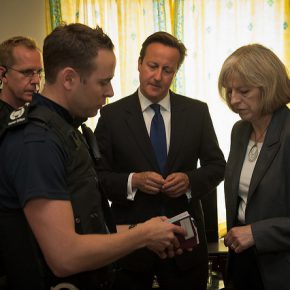In 2002, French voters expected that their first round of presidential voting, in which candidates from many parties can run and the people are said to vote with their hearts, would end up with incumbent conservative Jacques Chirac against the Socialist Lionel Jospin coming in first and second. France, and the world, was shocked to see that the final contest instead would come between Chirac and far-right demagogue Jean-Marie Le Pen, who edged out Jospin in the first round.
All the major parties, despite many people’s distaste for Chirac, regardless of how they felt about him, backed Chirac on the idea that Le Pen and his openly racist National Front party were too dangerous to be in charge of the economy and military. Chirac won the second and final round, where the French are said to vote with their heads, with 82 percent of the vote.
A defeat for the National Front? Hardly. Today, despite the nation’s solidarity in 2002’s second round of voting against the ultra-nationalist agenda, the party under Marine Le Pen, Jean-Marie’s daughter, is now seen as a government in waiting, winning regional elections at a stunning rate. Some municipalities might not openly align with them, but this summer’s controversy of burqini bans on French beaches showed that the National Front’s anti-Islamic ideology had become mainstream. Socialist President
Socialist President François Hollande ’s attempt to move to the center earned him hatred from unions. Meanwhile, Le Pen, who has all the professional temperament and on-screen decorum that her father lacked, continues to gain in popularity, particularly amongst working and middle-class voters, as have other far right leaders across Europe.
What does this have to do with the United States? For people who are scared of Donald Trump’s openly fascist agenda, but uneasy about Hillary Clinton’s backing from conservatives and Wall Street, especially on the left, the closer we get to Election Day the more our heads start winning out over our hearts. Prominent leftists including Noam Chomsky, Angela Davis and Adolph Reed Jr.—all of whom have spent their lives being critical of the Democratic Party—have sensed that Trump’s brand of racism and bullying makes him a unique threat to the nation, especially to minorities, making “lesser evil” voting a practical necessity for immediate survival.
https://www.youtube.com/watch?v=oaaIvA_Tleo
A lot former Bernie Sanders supporters who had promised never to pull the lever for Clinton are having second thoughts, especially if they live in swing states, knowing that a Trump Administration would hand former military and formal executive authority to white nationalists ready to cut off immigration, whip up hostility toward Muslims and crush any movement that opposes police militarization or excessive policing of minorities.
Here’s the hard truth: Biting the bullet and voting for Clinton is the easy part. It’s what anti-racists build after Election Day, even after a Trump loss, that matters.
Consider this. Trump has yet to receive any major newspaper endorsement, as even the most conservative editorial boards have either backed Clinton in order to stop Trump, or endorsed Libertarian nominee Gary Johnson. Clinton has the backing of prominent Republicans of the old guard and the neoconservative circles, the support of Wall Street and the endorsement of many in the high levels of the defense community. The all powerful “establishment” has picked a side, and it’s not Trump’s.
And yet, while a Trump presidency is unlikely, he still not only won a major party nomination but has kept the race competitive and will likely win handily in red states and compete well in many swing states—places like Ohio and Florida are still in play. White nationalists and reactionaries against the spread of racial and religious tolerance, once relegated to political obscurity, are now the united “alt-right” who are going to have an impressive showing this November. Racist hate groups like Stormfront and the Ku Klux Klan, thought to be suffering their death agonies in the 21st century, are finding new life in Trump’s candidacy.
This anti-Muslim, anti-immigrant movement will see that short of a landslide Clinton victory, it will have the potential to win in the future. Trump might move out of politics after a loss, but perhaps his movement could find a more tempered candidate, one less prone to buffoonery and narcissism and give the movement more public credibility, like what Marine Le Pen did for the National Front.
That’s why voting for Clinton is the easy party of resisting this movement. Let it be said, anti-racists living in swing states have an outright obligation to vote Clinton no matter what qualms they might have with her. But those duties to Team Hillary end there, and what needs to begin after her election is the kind of organizing to stop Trump’s in the future.
Firstly, that means putting the cause of racial justice at the forefront of our political discussions. Liberals and progressives alike must work closer to amplify the concerns of the Black Lives Matter movement and those fighting for a more just and human immigration system, and Jews, traditionally an ally to social progress in American history, need to be a part of that discussion.
And just as important to that is a struggle for economic justice. Trump has been able to gain the support of white working class voters in large part because the Democratic Party has moved to the right economically, leaving it, once a part of the now-in-decline labor movement, without a political voice. Trump, for better or for worse, at least reached out to this community. Instead of offering a real economic justice movement, he used the scapegoat of foreigners for the reason their wages had declined and the jobs had disappeared.
So it’s a responsibility of any anti-racist movement to speak directly to the issues of poverty in places like the hills of West Virginia just as it as to speak about the problems of racial discord in Ferguson, Missouri.
And more broadly, we have to recognize that organized and politicized white nationalism is here. After November, progressives must be creative in how we dismantle that movement. Keeping them out of formal power in this election is step one. But there are many more steps ahead.
Photograph courtesy of Ninian Reid. Published under a Creative Commons license.





